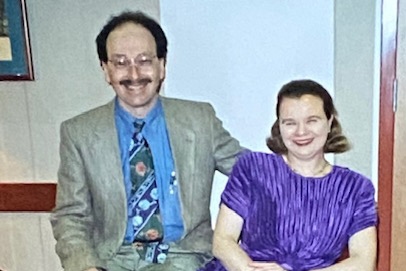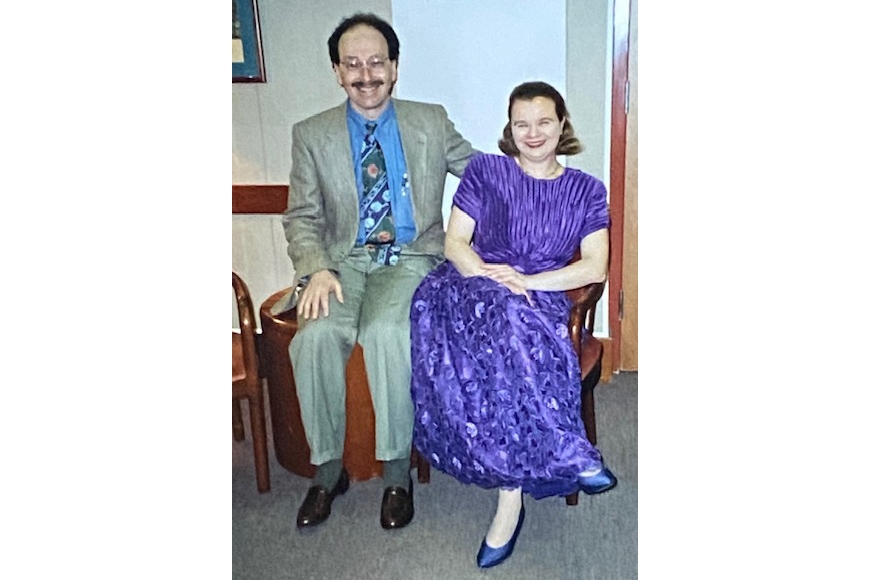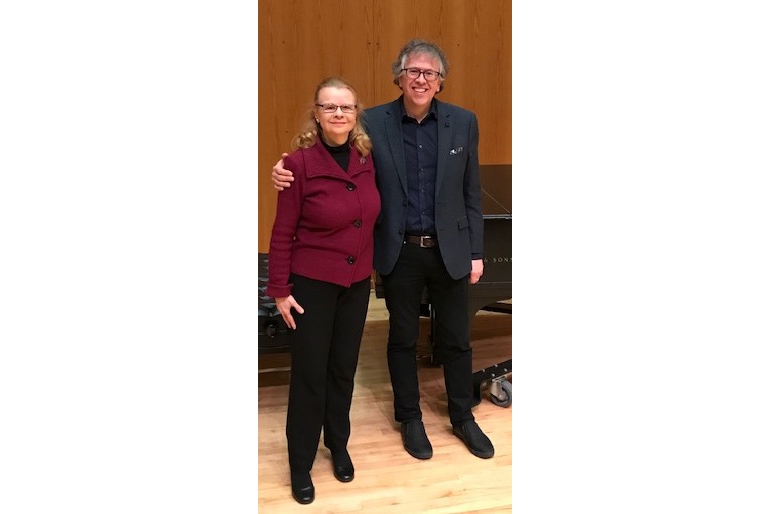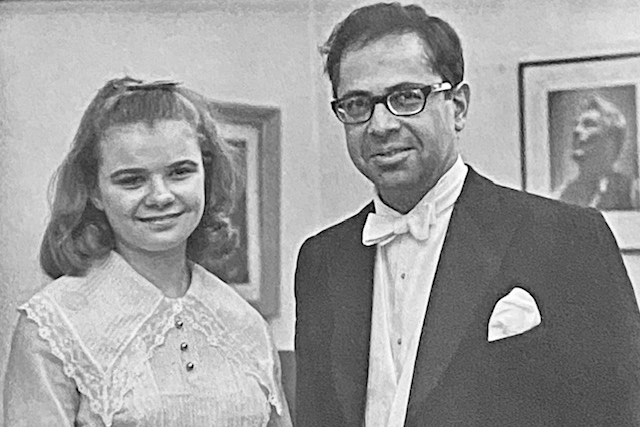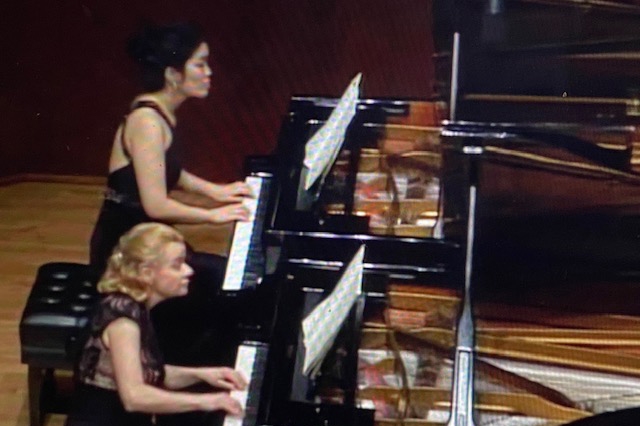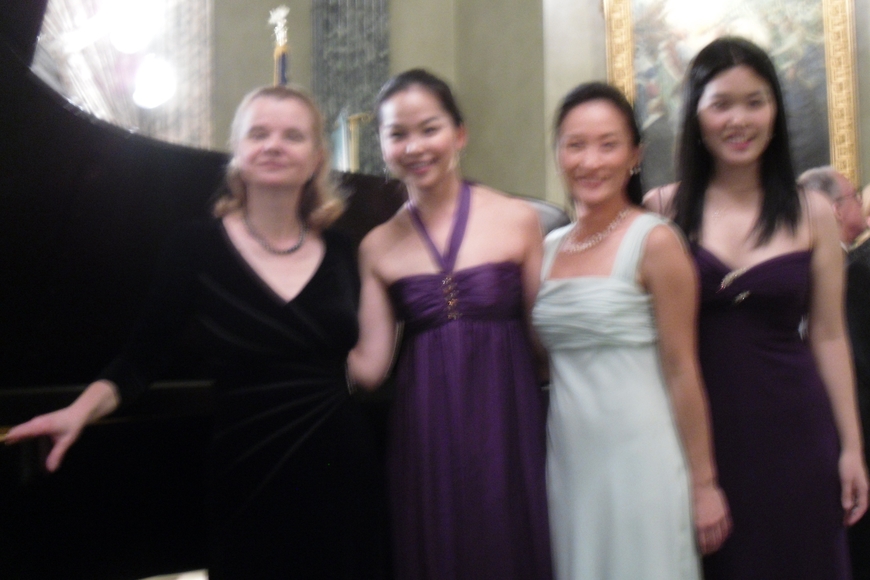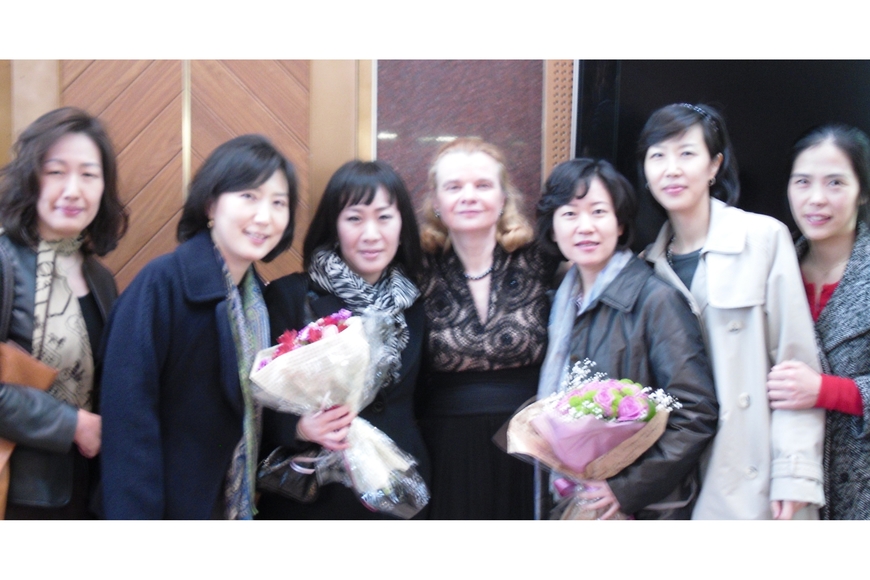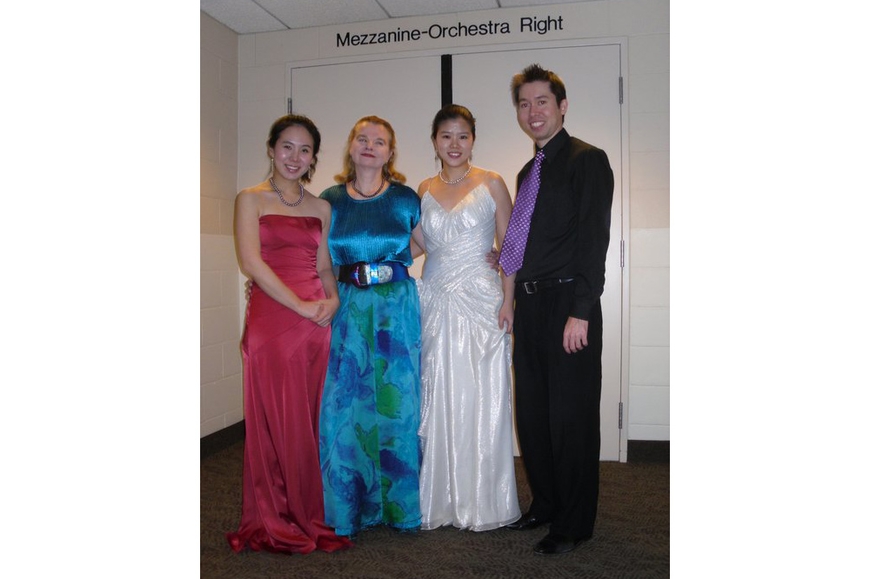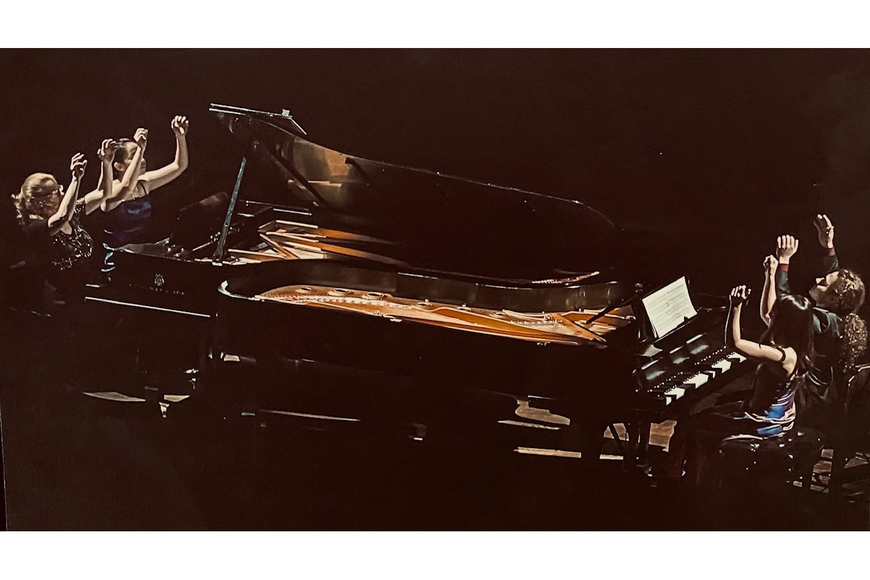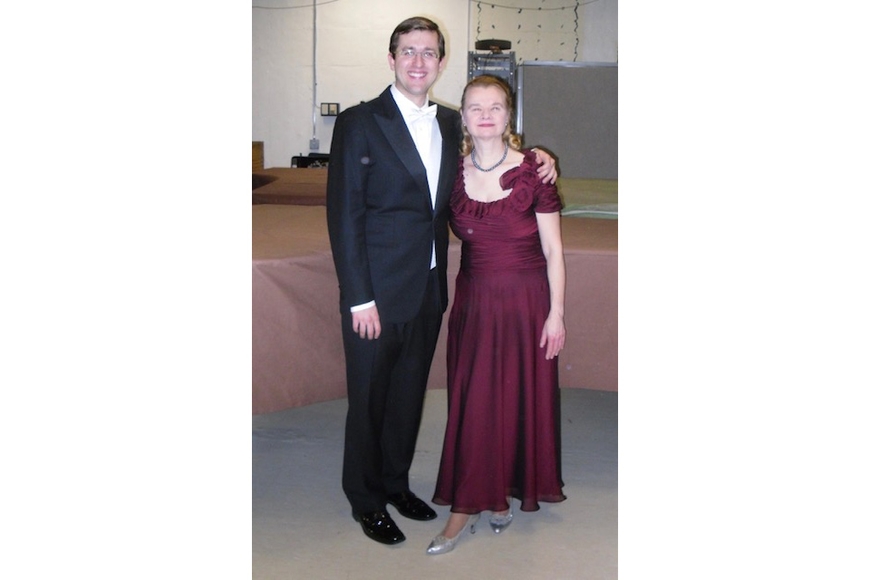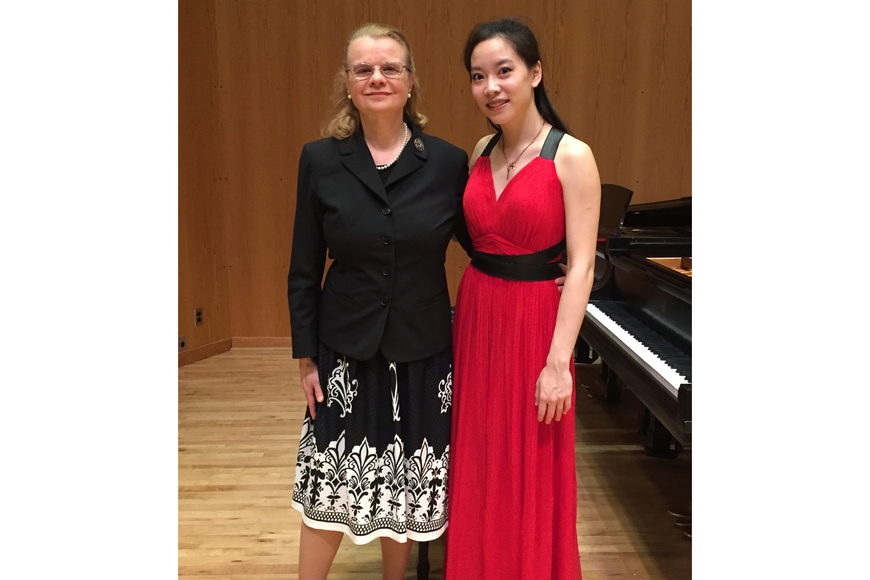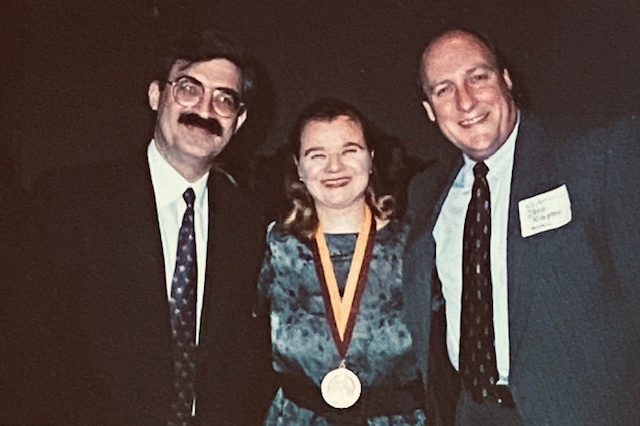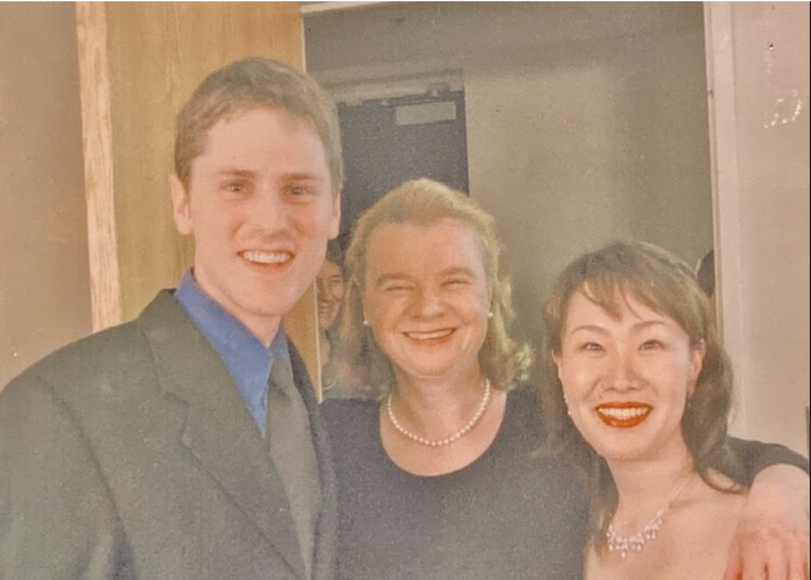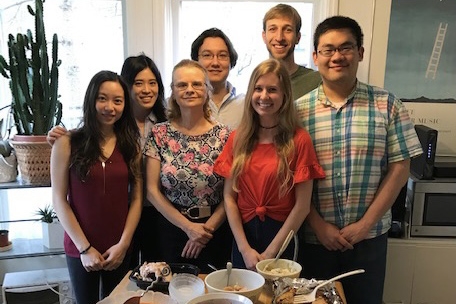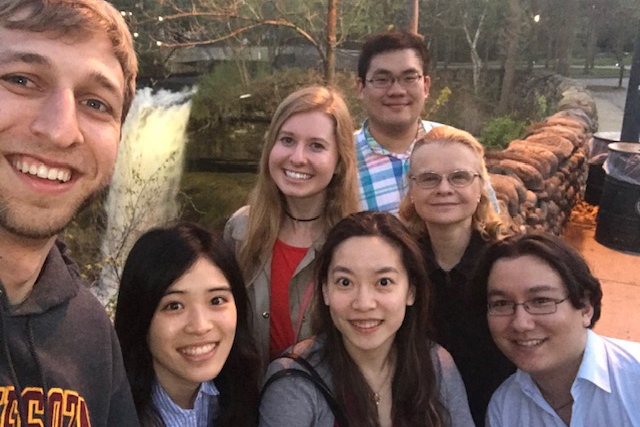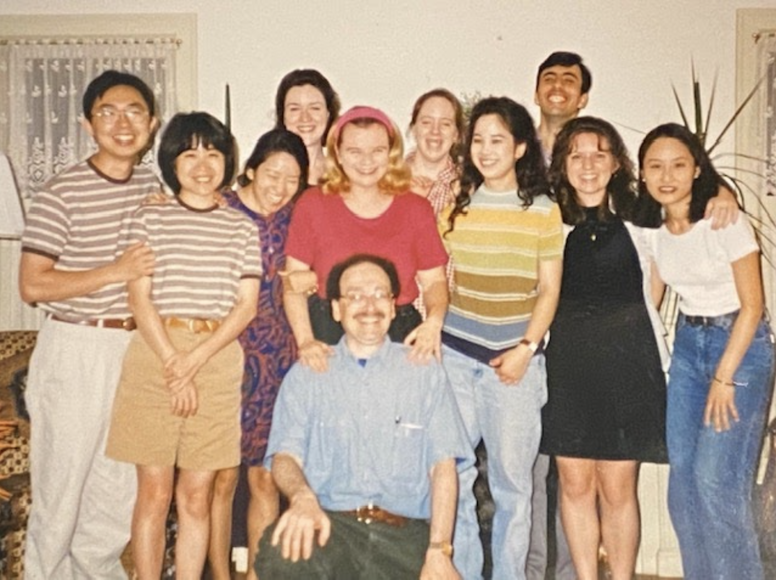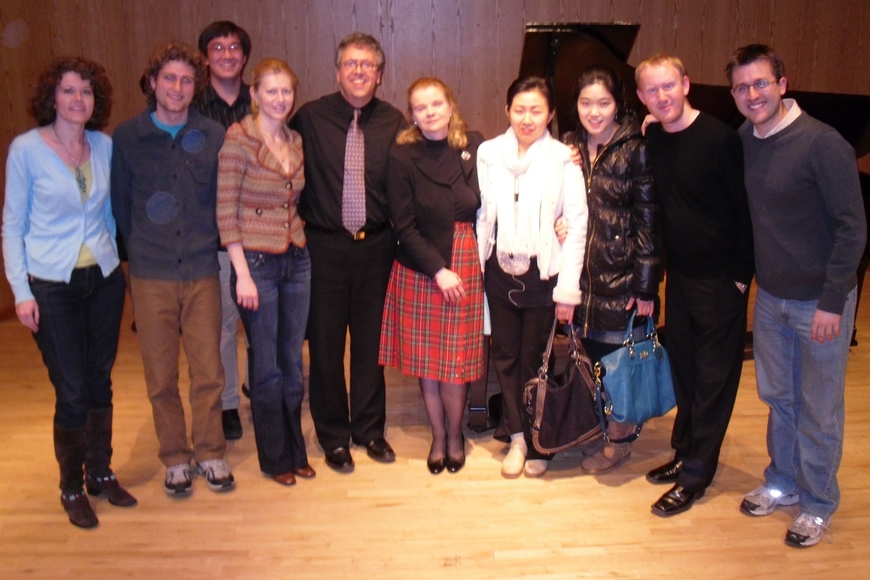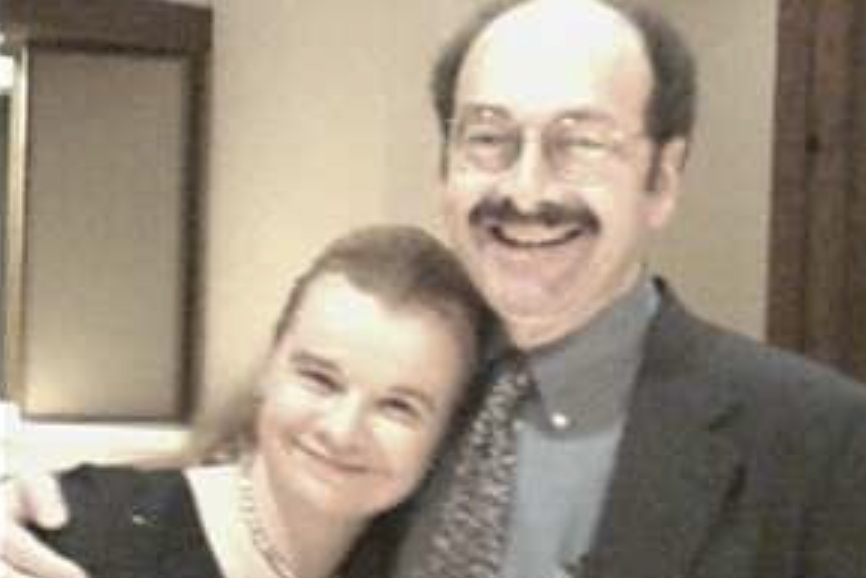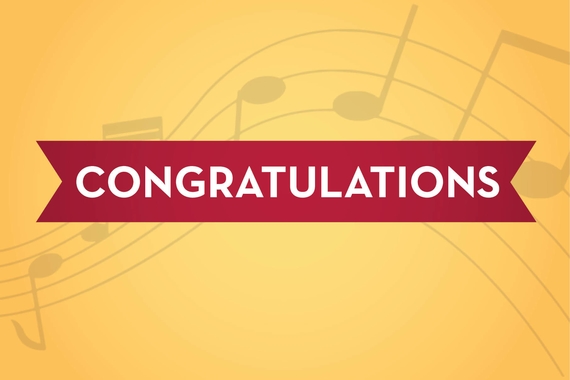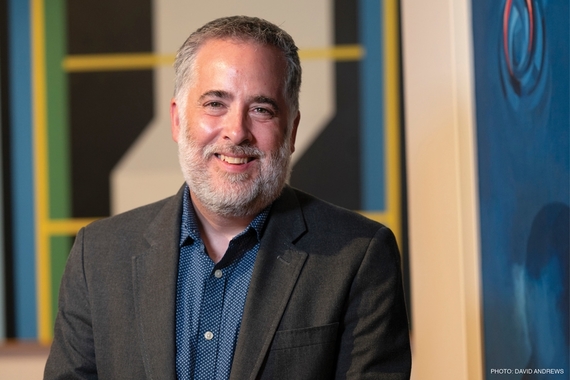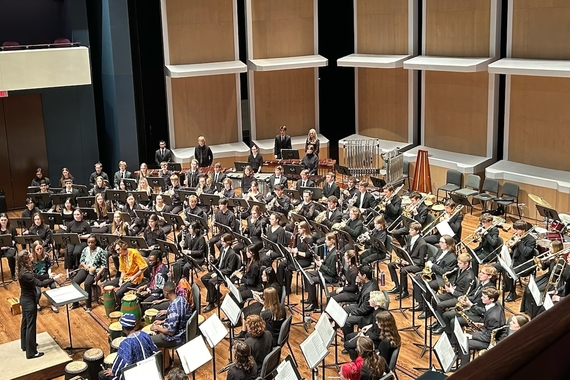Celebrating the Careers of Professors Emeriti Lydia Artymiw and David Grayson
Corey Hamm, DMA piano performance 2005
After thirty-one years of inspiring teaching and mentorship at the University of Minnesota School of Music, husband-and-wife professors David Grayson, Emeritus Professor of Musicology; and Lydia Artymiw, Emerita Distinguished McKnight Professor of Piano, retired in May 2020. Their influence is too great to quantify, and they will be dearly missed.
It was shortly after Lydia’s Minneapolis debut in 1987 with the Guarneri Quartet at Orchestra Hall that Karen Wolff, the new Director of the School of Music, asked if Lydia might consider teaching at the University of Minnesota. After successful interviews, both Lydia and David, who had been on the faculty at the University of Illinois at Urbana-Champaign, began teaching at the U of M in Sept. 1989.
I am so thankful to be one of the many students privileged to have studied with both Lydia and David. Lydia was my beloved piano professor for my MM and DMA (2005) piano performance degrees, and David taught me in his fantastic Performance Practice, and Mozart Piano Concerto seminars. As a piano professor myself, since 2005 (sixteen years!) at the University of British Columbia in Vancouver, Canada, I can truthfully say that I am constantly thinking about the wisdom Lydia and David offered, and I try to pass it on, as best I can, to my own students. Whether it is a stylistic principle, an ingenious fingering, a stunning phrasing, a general acoustic approach, or advice on giving a masterclass, not to mention countless fabulous stories, they have shared ideas that helped their students and by extension, their students’ students, continuously and for the rest of their lives. There are many hidden gems that I didn’t realize at the time contained wise advice, but I am now benefitting from them as I accumulate new experiences as professor and performer - seeds planted by David and Lydia over sixteen years ago.
It must have been a tremendous challenge to juggle attentive and conscientious teaching with concertizing, which requires daily practicing (often late into the night), learning piles of new repertoire (including contemporary works), rehearsals, and travel in addition to the performances themselves, typically on unfamiliar pianos. During her thirty years at the School of Music, Lydia fulfilled over 50 engagements as soloist with orchestra, including: the Cleveland Orchestra, Orchestra of St. Luke’s, Los Angeles Philharmonic at the Hollywood Bowl, Kansas City Symphony, Spokane Symphony (WA), Eugene (OR) Symphony, Colorado Symphony, Phoenix Symphony (AZ), Richmond Symphony (VA), Florida Symphony, Rochester Philharmonic (NY), Chattanooga (TN) Symphony, Auckland Philharmonic (New Zealand), Seoul Philharmonic and Gwangju Symphony (S. Korea), Lviv Philharmonic (Ukraine), Manila Symphony (Philippines), McGill Chamber Orchestra (Montréal, Canada), and multiple engagements with the Minnesota Orchestra and the Saint Paul Chamber Orchestra. She also performed at over 40 national and international chamber music festivals with such renowned artists as the Guarneri, Tokyo, American, Miami, Borromeo, Shanghai, and Orion Quartets, Kim Kashkashian, Benita Valente, John Aler, Marcy Rosen, and Arnold Steinhardt and Jules Eskin. Lydia performed solo recitals throughout the US, Canada, Europe, China, and Korea, presented over 150 master classes throughout the world, and made a number of recordings for the Artegra, Bridge, Centaur, Naxos, and Pantheon labels. Her Mendelssohn CD with cellist Marcy Rosen for the Bridge label, The Complete Works of Felix Mendelssohn for Cello and Piano, was nominated for a 2018 Grammy Award.
As service to the University of Minnesota, Lydia gave several very special performances over the years. In May 1991, BBC Radio 3 in conjunction with Minnesota Public Radio spent a weekend in the Twin Cities airing live performances with the Minnesota Orchestra, Saint Paul Chamber Orchestra, Minnesota Opera, and Guthrie Theater, along with a one-hour solo recital by Lydia broadcast live from Lloyd Ultan Recital Hall at the School of Music to millions of listeners worldwide on the BBC network. In 1992, Schmitt Music arranged for Lydia to perform a solo piano scholarship benefit recital on Vladimir Horowitz’s touring Steinway concert grand at Rarig Theater on the U of M campus. And in June 2001, Lydia joined the Minnesota Orchestra under the direction of Stanislaw Skrowaczewski for a performance of Schumann’s Introduction and Allegro Appassionato, Op. 92 at Northrop Auditorium, celebrating the 150th anniversary of the University of Minnesota School of Music.
Lydia pushes her students to do their very best, always striving for an ever higher level. Lydia’s priority was always artistry—in her own playing as well as her students—and she believed that while a secure technique and impeccable rhythm are an important foundation, a true artist must build on that foundation with a broad dynamic range, deeply sensitive awareness of the most subtle harmonic changes, organic and intelligent phrasing, great variety of articulation and color and, of course, an expansive sonic imagination and creativity— all of which Lydia possesses to the nth degree. For Lydia, instilling professionalism was a top priority and included the formalities and etiquette of a performer’s concertizing life, ensuring that her students knew how to bow properly (including following concertos!), create a CV and biography, and give a masterclass. Lydia also instilled valuable pedagogical skills that I value so much to this day by expecting her students to voice their opinions after a studio class performance in order to develop positive criticism and quick reactions to what the students had just heard. This is now an important part of my own teaching as I’m sure it is with all of Lydia’s students.
Lydia believes that “a teacher often treats their own students the way they were treated by their teachers.” In 1967, at age thirteen, she began studying with the renowned American concert pianist and former President and Director of the Curtis Institute of Music in Philadelphia, Gary Graffman. Lydia studied with Mr. Graffman for twelve years. Among Mr. Graffman’s other students are Lang Lang, Yuja Wang, Haochen Zhang, and Robert McDonald. Thanks to Lydia’s great talent and seriousness of purpose, Mr. Graffman treated her as a young professional and invited her to perform four-hand and two-piano works with him in several important venues: the Mostly Mozart Festival at Geffen Hall (Lincoln Center), NY, People’s Symphony Series, NY, and a special performance of the Brahms Sonata for Two Pianos for a Lucille Katchen Memorial concert in New Jersey.
These wonderful memories inspired Lydia to perform frequently with her own students, whether at the annual School of Music Collage concerts in Ted Mann Concert Hall, or as their “orchestra” in concerto performances for degree recitals and competitions. In 2010, Lydia played two-piano works with her DMA graduate Woobin Park at the Seoul Arts Center, and they performed again in 2012 at Steinway Hall in New York with two of Lydia’s other DMA graduates, Young Kim and Jiye Kim. Dean James Parente attended this performance.
In January 2011, Lydia and her former student Andrew Staupe were invited to perform the Mozart Concerto for Two Pianos, K. 365 under the direction of Osmo Vänskä and the Minnesota Orchestra. From the Minneapolis Star Tribune (January 2011):
“The Mozart Concerto for Two Pianos (with Osmo Vänskä conducting the Minnesota Orchestra) featured veteran Lydia Artymiw and her former student, Andrew Staupe. The soloists traded phrases back and forth in a dialogue that revealed their accomplished virtuosity. They were clearly reveling in playing off one another. Their joy was infectious."
Lydia often felt happiest when her students earned their own successes. Two of her students were first prize winners of the WAMSO/Friends of the Minnesota Orchestra Regional Competition: Wonny Song in 2001 (who also won the Grand Award) and Andrew Staupe in 2006. Both were re-engaged to perform with the Minnesota Orchestra on their subscription series. Andrew Staupe was re-engaged eight times, an amazing achievement. Song also won the 2005 Young Concert Artists Competition under Lydia’s guidance. In 2017, Fanya Lin won 4th prize at the Hastings International Piano Competition in England and performed with the Royal Philharmonic Orchestra.
Lydia’s U of M studio was one of the most prolific, with 48 DMA, 22 MM, and 9 BM graduates. She is also the only School of Music professor to receive three important University awards: the 2000 Dean’s Medal, 2001 Distinguished McKnight Professorship, and 2015 Excellence in Graduate and Professional Teaching Award. More details regarding Lydia’s students’ successes and academic positions can be found at her website: lydiaartymiw.com.
At the invitation of Elaine Schuessler and Bruce Karstadt, President and CEO of the American Swedish Institute (ASI), Lydia took charge of the Piano Recital Series at the ASI from 2002-2009. University of Minnesota pianists who performed there were Jeri-Mae Astolfi, Christopher Brody, Alejandro Cremaschi, myself, Seongwon Han, Hiyas Hila, Sora Oh, Woobin Park, Wonny Song, Andrew Staupe, Christopher and Megan Wallace, and Stephanie Wendt. These recitals established greater community visibility for U of M pianists, and we certainly appreciated these important recital experiences.
In 2001, Dean Steven Rosenstone made a proposal to the keyboard department: if they could raise $25,000 by the end of the 2001-2002 academic year, the College of Liberal Arts would endow a graduate piano fellowship. Lydia took on this challenge herself, contacting all of her former students who had received financial aid, asking them to contribute and contributing $15,000 herself! Thus the “Centennial Graduate Piano Fellowship” was born, and it has been assisting talented U of M piano students since 2002.
Lydia and David are not only wonderful professors, but also very warm and generous people. Valuable extra lessons in preparation for recitals and competitions were the norm, as were always patient, helpful, and fascinating office or hallway conversations about upcoming assignments or about music in general. They would also frequently (23 in 30 years!) host and prepare elaborate and fun Thanksgiving meals and barbecues at their home for Lydia’s out-of-town students. Going well above-and-beyond, Lydia would drive many of her female students to Macy’s and Nordstrom to buy them concert gowns and shoes for their performances. And I can attest that Lydia and David were always there for their students in both good times and bad. All of this musical and personal warmth make them truly magnificent professors.
In preparing this article, it has been incredible for me to see the breadth and depth of Lydia’s and David’s profound influence on their students. Their students are of great accomplishment and are performing and teaching in universities and colleges and in their own teaching studios throughout the world, publishing articles and books, making commercial recordings, giving masterclasses and lectures, commissioning composers, judging competitions, among many other things. But in spite of the wealth of brilliant musical ideas offered up by David and Lydia, perhaps even greater (if possible!), and something that all their students will try to emulate, is their fiery, sincere, and deeply passionate love of music itself. No one that has ever encountered Lydia and David, whether in a multi-year degree with weekly lessons and classes, a relatively brief masterclass or lecture, or even, say, a casual conversation about a work or recording, can have been uninfluenced by their fire and passion. This is one of Lydia’s and David’s greatest attributes, and it comes across boldly in their performances and writings, just as it does in their conversations in a hallway or over a meal. What could be more inspiring than to see your teachers doing everything so brilliantly, but always also with the tremendous work ethic and sense of standards that necessarily go along with it.
I always love my conversations with David, witnessing his vast knowledge, but more importantly, his astounding ability to organize and chart a path through the obstacle course of facts in order to show a “cool” musical relationship. His teaching in class was never dry and boring, but always fascinating and presented in such a conversational way. Somehow at the end of class we had been taught something profound, maybe even highly complex, but only in the most enjoyable way, and always accompanied by David’s own palpable excitement. Ideal qualities in a teacher!
Among the many things David is expert in (maybe everything?), he is an internationally recognized expert in the music of Claude Debussy, particularly his opera Pelléas et Mélisande. His expertise is indeed so great that such world-renowned conductors as Pierre Boulez, Claudio Abbado, Valery Gergiev, John Eliot Gardiner, and Mark Elder all consulted with David about the work and various issues concerning its score and subsequent revisions in preparation for their own performances and recordings. David’s program notes were used for performances by the Metropolitan Opera, and at Boulez’s request, he wrote a special note for his performances with the Welsh National Opera. In 2000-2001, again upon Boulez’s recommendation, David was asked to be on the Carnegie Hall Program Committee.
David wrote the acclaimed book The Genesis of Debussy’s Pelléas et Melisande (1986. UMI Research Press, Studies in Musicology), and he was editor of the 2010 Durand edition of the Pelléas vocal score, a much needed and long overdue critical edition, based on autograph and other manuscript and printed scores, that finally incorporates Debussy’s revisions after the first publication. He is currently working as editor on Durand’s new edition of the full score of Pelléas. For Cambridge University Press, David wrote the book Mozart Piano Concertos Nos. 20 and 21, part of their Cambridge Music Handbooks series. He has also written numerous articles about Debussy for such prestigious journals and anthologies as Music & Letters, The Cambridge Companion to Debussy, Debussy Studies, Cahiers Debussy, 19th-Century Music, Nineteenth-Century Music Review, and Journal of the American Musicological Society. For more details of his work, see David’s “Faculty Research Profile” in the 2018-2019 issue of Tutti: z.umn.edu/grayson.)
Owing to David’s multifaceted knowledge and abilities, he worked with Peter Gelb (currently General Manager of the Metropolitan and formerly President of Sony Classical). He was involved in script development for a number of programs with Yo-Yo Ma, including Dvorak in Prague (Sony), and toured with Wynton Marsalis for the making of his book and scripts for the films Marsalis on Music. David also wrote numerous sets of liner notes for recordings on the Sony, RCA/BMG, Deutsche Grammophon, ECM, Bridge, and Chandos labels.
David’s own amazing development saw him study composition under the great American composers Earl Kim and David Del Tredici during his undergraduate degree at Harvard University. He then studied with the legendary Nadia Boulanger in Paris, learning from her about the expression of music in conjunction with the discipline of craft. Returning to Harvard for his AM and PhD in Musicology, he served as Teaching Assistant for Leon Kirchner, another great American composer. During summers, he was also the Assistant Recording Engineer at the Marlboro Music Festival 1971-76, working with and recording such musical giants as Rudolf Serkin, Pablo Casals, Mischa Schneider, Mieczyslaw Horszowski, Murray Perahia, and Yo-Yo Ma, among others. There, David had the amazing opportunity to turn pages for Serkin, Horszowski, and Lydia Artymiw, his future wife. David and Lydia also collaborated in lecture recitals at Lincoln Center, University of Texas-Austin, and other places in such topics as Schumann Performance Practice, Rubato in Chopin, Mozart Piano Concerti ornamented by Hummel and Cramer, and Ornamentation in Mozart. I was lucky to see their lecture-recital about Schumann, and I still marvel at the interaction of two brilliant minds and Lydia’s stunning piano playing.
What a pleasure it has been to reminisce while writing this article. I have such fond memories of my studies with Lydia and David, and I cherish the inspirational artistic fuel they have given me and all their students through their brilliant teaching, inspired performances and writings, and warm humanity. We wish them all the best in their retirement and look forward to hearing all about what is yet to come.
About the Author
Pianist Corey Hamm has premiered over three hundred solo, chamber, and concerto works by composers from all over the world. His CD of Frederic Rzewski’s hour-long solo piano epic The People United Will Never Be Defeated! won Spotify's Best Classical Recording 2014, and Best Classical Recording at the 2014 WCMA. Frederic Rzewski received Corey Hamm’s interpretation as one of the finest to date: “Excellent! Bravo! This may be the best recording.” He has performed the work over 80 times. Corey Hamm’s extensive work in the 1990s with the great French composer Henri Dutilleux will come to fruition in his upcoming plan to record Dutilleux’s complete works for solo piano and chamber with piano. Other upcoming recordings include those by PEP (Piano and Erhu Project), The Nu:BC Collective, and others of solo piano works written for Corey by Rzewski, Finnissy, Psathas, Zolty, Chang, Morlock, Nobles, Hamel, Yedidia, and Maunders.
His most extensive collection of commissioned works includes over 80 pieces for PEP (Piano and Erhu Project) with erhu virtuoso Nicole Ge Li. Among the many composers who have written for PEP are Michael Finnissy, GAO Ping, Keith Hamel, Dorothy Chang, Stephen Chatman, Brian Cherney. The result is a new and flourishing multicultural catalogue of works for piano and erhu composed in the musical languages of the 21st century. PEP has released some of these works on three CD volumes (so far) with Vol. 2 nominated for Best Classical Recording at the 2015 WCMA.
Recent and upcoming concerto performances include Bartok Piano Concerto 2, Prokofiev Piano Concerto 3, the world premiere of Dorothy Chang’s Gateways (for erhu and piano soloists) with PEP and the VSO, Fauré Fantasie, and Lutoslawski. He has given many masterclasses and judged competitions nationally and internationally for such organizations as The American Piano Association Competition, Hong Kong Schools Music Competition, Seattle International Piano Festival, and the CMC National Finals.
Dr. Hamm is Professor of Piano at the University of British Columbia in Vancouver, where he was awarded the prestigious Killam Teaching Award, and the Dorothy Somerset Award for Artistic Excellence. He is on the Piano Faculty of the Summer Institute for Contemporary Performance Practice (SICPP) at the New England Conservatory (NEC) in Boston, MusicFest Perugia, in Italy, and the Great Lakes International School of Music (GLISM). His beloved teachers include Lydia Artymiw, Marek Jablonski, Stéphane Lemelin, Ernesto Lejano, and Thelma Johannes O'Neill.
